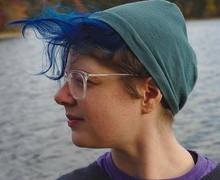Interview with Molly de Blanc
The Ethics Behind Your IoT

Molly de Blanc will give a talk about The Ethics Behind Your IoT at FOSDEM 2020.
Q: Could you briefly introduce yourself?
My first free and open source software contribution was in 2008, when I helped organize a conference. Since then I have organized more conferences, coordinated communities, spoke, and done a lot of writing.
I work at the GNOME Foundation, which I enjoy a lot. The GNOME community is amazing, and I really believe in the work the project is doing to create a free desktop that’s usable by everyone, regardless of ability or geography.
I’ve been on the board of the Open Source Initiative for almost four years, and currently serve as president of the board. I’m also a Debian Developer.
I have a really great cat, even though he mostly ignores me. Sometimes I give him a little smoked salmon, as a treat. I also live with the best dog (all dogs are the best dog), two adults, and a really amazing baby (who isn’t mine). I’ve been getting into swimming, though I still love bikes, climbing, and hiking. I drink too much coffee, but I’m working on drinking less.
Q: What will your talk be about, exactly? Why this topic?
My stated topic is the ethics behind Internet of Things (IoT) devices — problems that have arisen and questions we need to be asking ourselves as we design, build, and sell these devices. But really, the talk is about social responsibiliy and the risks IoT devices pose not just to the privacy of individuals, but the health of communities.
We do a good job talking about the individual and the rights of the individual in FOSS, but we fail to take into account the impact technology has to the community and the collective. I want to see us shift the conversation away from ourselves and instead ask how we can help others, in part by bringing attention to the problems others face.
Q: What do you hope to accomplish by giving this talk? What do you expect?
I hope you’ll laugh at my jokes. I also hope you’ll be a responsive audience and do things like nod in agreement when you think I’m saying something good.
Most of all, I’d like you to leave understanding that all IoT devices are a form of surveillance that risk our physical and digital autonomy. I want you to understand how these technologies impact communities, marginalized populations, and you.
Q: What has changed over the last 20 years in the social impact that devices have on individuals and society as a whole?
Twenty years ago one of my best friends didn’t have a computer at home, and I used to check their email for them, reading the messages over the phone. I’m pretty sure they check their own email now, and likely do it from their phone.
I’ve spoken previously at SeaGL, CopyLeft Conf, and FOSS North about the way I use tech — and especially free software — as part of how I manage my bipolar disorder. I make jokes about how my lifestyle would not be possible without a mobile GPS and maps app. My brother lives in Tokyo, my parents in central Arizona, and we have a group chat and are now closer than we’ve been in a long time.
These are just some personal anecdotes. I could probably fill a book with thoughts, so if you see me in the hall and want to talk more, just say hi. I have blue hair.
Q: 2020 marks the 20th anniversary of (F)OSDEM. What contributions has FOSDEM made to the advancement of FOSS, or how did you in particular benefit from FOSDEM?
Spencer Krum summed up why FOSDEM is so great when he said that for many people, FOSDEM is the first place they can wear a nerdy T-shirt and have people just get what it’s about.
Q: Have you enjoyed previous FOSDEM editions?
I enjoy going to Brussels for FOSDEM so much I even wrote a song about it! It’s on my band’s upcoming EP.

Creative Commons License
This interview is licensed under a Creative Commons Attribution 2.0 Belgium License.